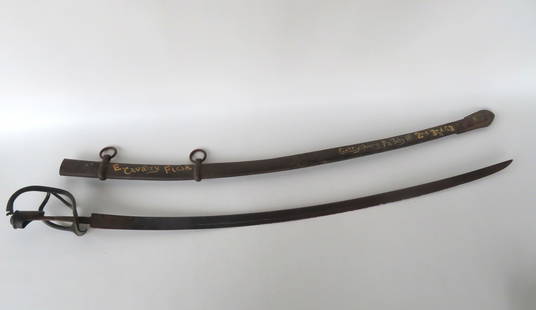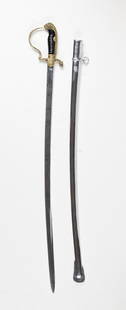
WELLINGTON DUKE OF: (1769-1852) Anglo-Irish Field
Similar Sale History
View More Items in Militaria & War MemorabiliaRelated Militaria & War Memorabilia
More Items in Militaria & War Memorabilia
View MoreRecommended Collectibles
View More








Item Details
Description
WELLINGTON DUKE OF: (1769-1852) Anglo-Irish Field Marshal & British Prime Minister 1828-30, 1834. An excellent, long A.L.S., Wellington, seven pages, 4to, Stratfield Saye, 8th April 1828, to Mr. Grant, marked Confidential. Wellington states that he had wanted to consult the Treaty of Vienna before replying to his correspondent, but does not have a copy of it at Stratfield Saye, and therefore writes from his memory only, ‘As well as I can recollect the words and spirit of the Treaty of Vienna the King of the Netherlands has no right any more than the King of Prussia, or any other Sovereign on the banks of the Rhine to…[prevent]…foreign built vessels or foreigners from navigating that River’ and further writing ‘I don’t believe the King of the Netherlands and all the Sovereigns on the Rhine have a right to lay a particular duty upon any particular commodity for its passage up or down the River, or its transit through their respective territories…’ although advising ‘This is as well as I recollect the spirit as well as the letter of the Treaty. But upon this point you had better consult somebody more capable of giving an opinion than I can be; such as….the Lord Chancellor’. Wellington further adds ‘I don’t know whether you have read the papers which you have sent to me; but I confess that I cannot find any objection on the part of the Prussian Govt…on the contrary I should say that the two parties had now agreed upon every point; and that the King of the Netherlands had now a right to claim the cooperation and support of the King of Prussia in the commission…However I may be mistaken’ and continues ‘This question of the navigation of the Rhine is a very delicate one. The King of the Netherlands is very sore about it; and I know that the Emperor of Russia is disposed to favour…the strict performance of the conditions imposed upon him by the Treaty of Vienna; and I believe this to be the reason why the King of Prussia appears to be so little difficult’. Wellington remarks that Baron Bulow should come to them confidentially, explaining ‘The first thing for us to do is to be quite certain that we are right; and that we cannot be excluded from the navigation of the Rhine. Let us then look at the whole of the proposed regulations; and see which are inconsistent with the principles of the Treaty; and are important to us. Having this information we shall know what our case is; and shall be better able to judge than I am at present what we ought to do’, further offering advise to his correspondent on what to tell Bulow and concluding ‘I have no objection to the employment of Mr. Addington in a more advanced state of this business. But whatever we may do at the Court of the Netherlands should be through the Ambassador’. A letter of fine content. The final page is lightly mounted at the head to a page removed from an album. Some light age wear and a couple of very neat splits at a few folds, not affecting the text or signature. About VG
The Congress of Vienna was a conference of ambassadors of European states chaired by held in Vienna from September 1814 to June 1815. The objective of the Congress was to provide a long-term peace for Europe by settling critical issues arising from the French Revolutionary Wars and the Napoleonic Wars. The goal was not simply to restore old boundaries, but to resize the main powers so they could balance each other off and remain at peace. France lost all its recent conquests, while Prussia, Austria and Russia made major territorial gains. Prussia added smaller German states in the west, Austria gained Venice and much of northern Italy. Russia gained parts of Poland. The new kingdom of the Netherlands had been created just months before, and included formerly Austrian territory that in 1830 became Belgium. One of the main provisions in the final act was the freedom of navigation being guaranteed for many rivers,notably the Rhine, as discussed in the present letter, and the Danube.
Heinrich Freiherr von Bulow (1792-1846) Prussian Statesman and Diplomat. Ambassador to London from 1827, Bulow was trusted by many British statesman, as demonstrated in Wellington's letter.
The Congress of Vienna was a conference of ambassadors of European states chaired by held in Vienna from September 1814 to June 1815. The objective of the Congress was to provide a long-term peace for Europe by settling critical issues arising from the French Revolutionary Wars and the Napoleonic Wars. The goal was not simply to restore old boundaries, but to resize the main powers so they could balance each other off and remain at peace. France lost all its recent conquests, while Prussia, Austria and Russia made major territorial gains. Prussia added smaller German states in the west, Austria gained Venice and much of northern Italy. Russia gained parts of Poland. The new kingdom of the Netherlands had been created just months before, and included formerly Austrian territory that in 1830 became Belgium. One of the main provisions in the final act was the freedom of navigation being guaranteed for many rivers,notably the Rhine, as discussed in the present letter, and the Danube.
Heinrich Freiherr von Bulow (1792-1846) Prussian Statesman and Diplomat. Ambassador to London from 1827, Bulow was trusted by many British statesman, as demonstrated in Wellington's letter.
Buyer's Premium
- 22.5%
WELLINGTON DUKE OF: (1769-1852) Anglo-Irish Field
Estimate £250 - £350
1 bidder is watching this item.
Shipping & Pickup Options
Item located in Nottingham, ukSee Policy for Shipping
Payment

TOP




















![[CIVIL WAR]. Excellent US Model 1850 Staff & Field Officer's sword. Manufactured by Ames, Chicopee,: [CIVIL WAR]. Excellent US Model 1850 Staff & Field Officer's sword. Manufactured by Ames, Chicopee, MA. 32 in. slightly curved, single-edged spear point blade with 21 1/2 in. stopped median full](https://p1.liveauctioneers.com/197/250552/130130353_1_x.jpg?height=310&quality=70&version=1654186071)






![[CIVIL WAR]. Excellent French-made US Model 1840 Staff & Field Officer's sword. Retailed by: [CIVIL WAR]. Excellent French-made US Model 1840 Staff & Field Officer's sword. Retailed by Schuyler, Hartley & Graham. 30 3/4 in. straight double-edged spear point blade with a 24 in. stopped median](https://p1.liveauctioneers.com/197/250552/130130347_1_x.jpg?height=310&quality=70&version=1654186071)












![WORLD WAR I: ARCADIA BALLOON SCHOOL, ROSS FIELD, CALIFORNIA. Painted Balloon Panel. [California...: WORLD WAR I: ARCADIA BALLOON SCHOOL, ROSS FIELD, CALIFORNIA. Painted Balloon Panel. [California, late 1918.] A painted section of a cloth balloon, with brown background, decorated with the insignia of](https://p1.liveauctioneers.com/1043/322173/175618602_1_x.jpg?height=310&quality=70&version=1713986251)






![WORLD WAR I U.S. ARMY CEASE FIRE NOTICE: Original U.S. Army notice, 1p. 8vo., Saint Geneve, Fariest De Facq. France, [n.d.], sent to the ‘Headquarters 1st Battalion, 351st Field Artillery’, a cease-fire notice. The message reads](https://p1.liveauctioneers.com/287/325893/175485168_1_x.jpg?height=310&quality=70&version=1712934101)







![George Washington Signed Discharge: Partly printed discharge document signed by George Washington, as Commander in Chief of the Armies of the United States. Newburgh, [New York], 4 January 1783. 1 page, ## x ## in. Undersigned by Washin](https://p1.liveauctioneers.com/7226/322253/173251475_1_x.jpg?height=310&quality=70&version=1710004847)
![[Ambrotype] Texas Confederate Soldier: Sixth plate ambrotype. Full leatherette case. Portrait of a possible Texas Confederate soldier. A silver star device was used to pin up the brim of his light-toned headgear, a look often seen in image](https://p1.liveauctioneers.com/7226/322253/173251509_1_x.jpg?height=310&quality=70&version=1710004847)

![[CIVIL WAR] 1st Texas Infantry in Camp: Outdoor half plate ambrotype of the 1st Texas Infantry. Full leatherette case. Significant, large half plate ambrotype of members of the 1st Texas Infantry at ‘Splinterville,’ the regiment’s win](https://p1.liveauctioneers.com/7226/322253/173251512_1_x.jpg?height=310&quality=70&version=1710004847)
![Captured Bowie Knife w/ Period Note of Provenance: Captured Confederate D-hilt Bowie knife. [Kenansville, North Carolina]: [Louis Froelich factory]. With original metal and leather sheath with affixed period notes. First note with only remnants. Secon](https://p1.liveauctioneers.com/7226/325455/175169154_1_x.jpg?height=310&quality=70&version=1712370394)
![[CIVIL WAR] Black Soldier & Wife: CDV-sized tintype photograph WITH gem-sized tintype. Full thermoplastic case. Portrait of an unknown African American Civil War soldier who holds the rank of sergeant. He looks directly at the camera](https://p1.liveauctioneers.com/7226/322253/173251671_1_x.jpg?height=310&quality=70&version=1710004847)
![Historic Einstein Signed Program from Lincoln University Visit: Conferences on Objectives. Lincoln University, [Oxford], Pennsylvania, 3 May 1946. SIGNED BY ALBERT EINSTEIN. Tipped into Horace Mann Bond (1904-1972). The Education of the Negro in the American Socia](https://p1.liveauctioneers.com/7226/322253/173251693_1_x.jpg?height=310&quality=70&version=1710004847)
![[Civil War] Bullet Which Nearly Killed Soldier: Lead bullet encased in gold acorn fob with chain. Finely engraved: "W.D. Fiske / 14th Regt. C V / Fredericksburg / Dec 17, 1863." Acorn approx. 1 1/2 x 1 in. Overall length 6 1/2 in. Published in "Her](https://p1.liveauctioneers.com/7226/325455/175169103_1_x.jpg?height=310&quality=70&version=1712370394)

![[HANCOCK, John] Washington’s Spy, Officer’s Commission: Partly printed document signed by John Hancock as President of the Continental Congress, for Epaphras Bull (1748-1781). [Philadelphia, Pennsylvania], 10 January 1777. 1 page, ## x ## in. Completed in](https://p1.liveauctioneers.com/7226/322253/173251471_1_x.jpg?height=310&quality=70&version=1710004847)










